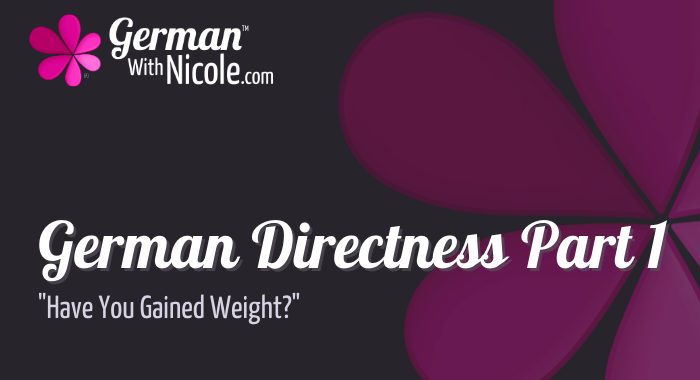German Directness, Pt 1. Have you gained weight?

Germans are incredibly direct. A German really will ask you if you've gained weight (Haben Sie zugenommen?), just as someone might ask if you have lost weight at another time (Haben Sie abgenommen?).
Why do they think it's OK to ask such a personal question?
What's disconcerting for people from the States, is that we don't ask this question unless we can tell for certain. For a German on the other hand, this question is simply a matter of fact and by no means a judgement.
Ask any American if s/he has gained weight, and you'll probably get an angry response. Here, that's simply a rude question. Weight is a hot-button issue here, and it's par for the course that someone might ask you if you've lost weight, and then follow it up with a compliment, no matter if your answer is yes or no. But we don't ask if someone has gained weight--in lies in the realm of rudeness.
Here's why a German might ask you this very direct and personal question.
The German asking you really just wants to know if you've changed. It's a Feststellung, an ascertainment, an observation. This might be mind-blowing for us, but think of it like this: It's not wrong, it's just different. (Thanks to Mrs. Mendez, my high school social studies teacher for that.) On average, Germans are really into health and wellness, nutrition and making sure they get regular exercise. They're not into being totally skinny, they're into being healthy. So a sign that you've gained weight to a typical German might be that you're not paying attention to your health.
The Germans are, after all, the ones who came up with the term der innere Schweinehund, your internal pig-dog who stops you from going on a run, puts a candy bar in your hand and an extra portion of cheese on your Spätzle.
How do I answer this question?
As painful as it might be, a simple answer of yes or no will suffice. Be aware that you might get a "Achten Sie auf Ihre Gesundheit!" in response. Like I wrote above, they are *really* into health and wellness.
And if you want to spark a little conversation, you could even go for the confusing answer and respond with the brilliant "jein," a combination of "ja" and "nein" that simply means "yes and no."
Ha!
Here's an enlightening comparison:
When you ask someone to do something for you, like take out the garbage, what exactly do you say?
A lot of folks that I know start with "Would you..." or "Do you wanna..." or even "Would you like to take out the garbage?"
WHAT?! Nobody *really* likes taking the garbage out. It's stinky, it can be messy, and it's just an annoying thing that needs to be done. But the question "Would you like to..." indicates choice on the basis of preference. It's garbage!
The German version of this, with a polite tone of voice is Bringst du (bitte) den Müll raus? Literally: Bring you (please) the garbage out? This is not a matter of choice, but simply: would you please do this thing?
Believe it or not, this direct kind of question is hard for German learners of all ages. Think of it as an exercise in efficiency, a wonderful facet of German culture we can adopt through learning the language.
Categories
- A1 (70)
- A2 (55)
- B1 (47)
- B2 (24)
- C1 (22)
- Deutsch lernen (82)
- Einkaufen (15)
- Essen (12)
- Grammatik (24)
- Hören (14)
- Landeskunde und Kultur (50)
- Lesen (11)
- Musik (5)
- Nachrichten (4)
- Podcast (56)
- Pronunciation (3)
- Schreiben (4)
- Schwäbisch (4)
- Spiele und Spaß (Games and Fun) (12)
- Sprechen (12)
- Vokabeln (41)
- Video (13)
Would you like to hear about future German classes with Frau Warner?
With the E-Post, you'll receive information on German class registration and goings-on in German classes, all written by Frau Warner. You'll receive an email on Tuesdays, plus an extra email or two when class registration opens or there's something new.
If you use Gmail: please check your "promotions" folder.
0 comments
Leave a comment